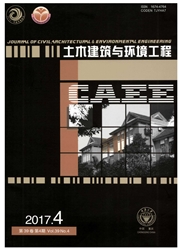

 中文摘要:
中文摘要:
病了的造的流行和风险因素在国内环境的症候群(SBS ) 症状被问询表调查在家环境上学习。从在重庆的随机选择的幼儿圆的 5299 个 3-6 岁孩子的父母,中国归还了在 2010 年 12 月和 2011 年 4 月之间的完成的问询表。父母 SBS 症状的流行(经常(每个星期) 与相比从未) :11.4% 为一般症状, 7.1% 为 mucosal 症状并且 4.4% 为皮症状。多重逻辑回归被使用为性和 asthma/allergic 鼻炎 / 湿疹控制。生活在一条主要道路或高速公路附近是为一般症状的一个强壮的风险因素(调整机会比率, aOR=2.16, P < 0.001 ) ,皮肤症状(aOR=2.69, P < 0.001 ) ,并且 mucosal 症状(aOR=1.63, P < 0.01 ) 。装饰是为一般症状的一个风险因素(aOR=2.00, P < 0.001 ) ,皮症状(aOR=1.66, P < 0.01 ) ,并且 mucosal 症状(aOR=1.66, P < 0.05 ) 。新家具是为一般症状的一个风险因素(aOR=2.16, P < 0.001 ) 并且皮肤症状(aOR=1.67, P < 0.01 ) 。潮湿相关问题(模子点,潮湿的污点,水损坏和冷凝作用) 都是为 SBS 症状的风险因素,作为是香的蟑螂,老鼠,和蚊子 / 苍蝇和使用的存在。保护的因素包括每天并且经常清洗孩子卧室暴露床上用品到阳光。在结论,成年人 SBS 症状与家环境的因素有关。
 英文摘要:
英文摘要:
The prevalence and risk factors of sick building syndrome (SBS) symptoms in domestic environments were studied by a ques tionnaire survey on the home environment. Parents of 5299 36 years old children from randomly selected kindergartens in Chongqing, China returned completed questionnaires between December 2010 and April 2011. The prevalence of parents' SBS symptoms (often (every week) compared with never) were: 11.4% for general symptoms, 7.1% for mucosal symptoms and 4.4% for skin symptoms. Multiple logistic regressions were applied controlling for gender and asthma/allergic rhinitis/eczema. Living near a main road or highway was a strong risk factor for general symptoms (adjusted odds ratio, aOR=2.16, P〈0.001), skin symp toms (aOR=2.69, P〈0.001), and mucosal symptoms (aOR=l.63, P〈0.01). Redecoration was a risk factor for general symptoms (aOR=2.00, P〈0.001), skin symptoms (aOR=l.66, P〈0.01), and mucosal symptoms (aOR=l.66, P〈0.05). New furniture was a risk factor for general symptoms (aOR=2.16, P〈0.001) and skin symptoms (aOR=l.67, P〈0.01). Dampness related problems (mould spot, damp stain, water damage and condensation) were all risk factors for SBS symptoms, as was the presence of cock roaches, rats, and mosquitoes/flies and use of incense. Protective factors include cleaning the child's bedroom every day and fre quently exposing bedding to sunshine, In conclusion, adults' SBS symptoms were related to factors of the home environment.
 同期刊论文项目
同期刊论文项目
 同项目期刊论文
同项目期刊论文
 Investigation of sleep quality under different temperatures based on subjective and physiological me
Investigation of sleep quality under different temperatures based on subjective and physiological me Assessing Adaptive Thermal Comfort Using Artificial Neural Networks in Naturally-Ventilated Building
Assessing Adaptive Thermal Comfort Using Artificial Neural Networks in Naturally-Ventilated Building Occupants'; adaptive responses and perception of thermal environment in naturally conditioned univer
Occupants'; adaptive responses and perception of thermal environment in naturally conditioned univer Physiological Expression of Human Thermal Comfort to Indoor Operative Temperature in the Non-HVAC En
Physiological Expression of Human Thermal Comfort to Indoor Operative Temperature in the Non-HVAC En Climatic Strategies of Indoor Thermal Environment for Residential Buildings in Yangtze River Region,
Climatic Strategies of Indoor Thermal Environment for Residential Buildings in Yangtze River Region, 期刊信息
期刊信息
